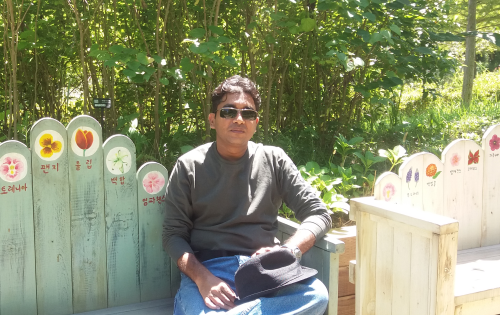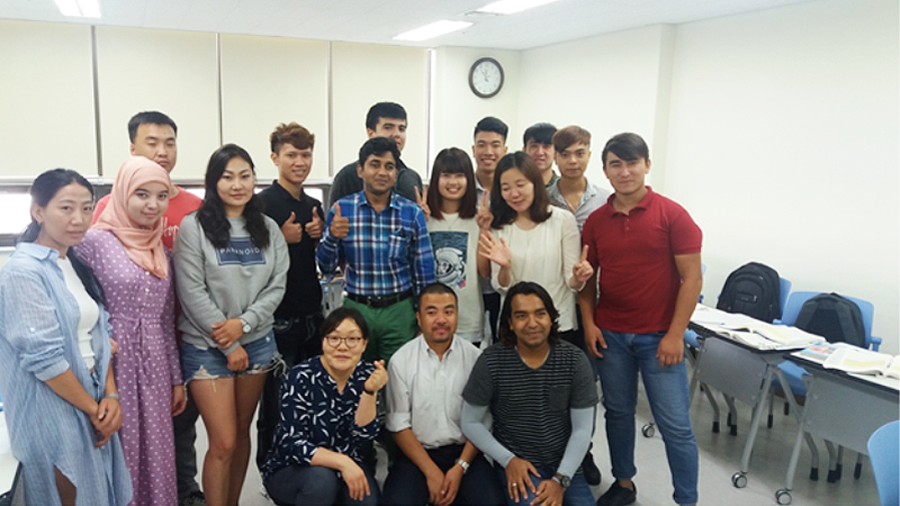
Ershad Komal Khan from Bangladesh
(ICHCAP;International Information and Networking Centre for Intangible Cultural
Heritage in the Asia-Pacific Region under the auspices of UNESCO)
Heritage in the Asia-Pacific Region under the auspices of UNESCO)

- The dismal weather had made the dawn gloomy when I arrived in the Republic of Korea in July as a CPI participant from Bangladesh for conducting a research on intangible cultural heritage with ICHCAP, UNESCO ICH category 2 center.
The uninterrupted drizzling in the hot day appeared quite different form the weather that I had experienced in my first visit to Korea in November 2012. In that time, the weather was cool and the mountains, adorned with the red maple leaves, appeared spectacular. And my task was also very easy-- just to attend in a weeklong workshop.
So, when I found the sky gloomy after my arrival this time, I thought the other Nature was a bit ‘sympathetic to the sorry state of this poor fellow’, who would be apart from the family and friends for five-months to do a lot of works including, taking part in a Korean language training course, writing a research paper on Intangible Cultural Heritage and attending some other programmes.
With the frequent alteration of the sun, cloud and rain, two months passed by in the provincial town Jeonju and just three months left of my sojourn in Korea. In the past couple of months, I and three other CPI participants from Nepal, Maldives and Bhutan, had taken part in Korean language training programme at the Chonbuk National University in Jeonju that ended last week.
The short language training course, designed and presented completely in the Korean language at the university, appeared to be difficult one for us, even though we could manage to get more marks than our expectations in the examination. It is also true that two-month training is not enough to learn a language, and of course not sufficient for Korean, which in terms of vocabulary, usage and grammar is completely different form most of the languages in the world. But, the short course could grow our interests in the language, which is sweet, lyrical, rhythmic and apparently seems perfect for literary works.
But, it is also true that the language appeared as the only hurdle to communicate with the people in markets, shopping malls, offices, public places and others in the beautiful hilly town Jeonju, which is a UNESCO inscribed heritage site and also an important tourist center famous for Korean food, historic buildings, sports activities, and innovative festivals.
Undoubtedly, the Koreans try to help but the mobile apps and sign language appeared as only modes for commutations and many funny incidents occurred due to faulty translations done by the apps, based on which enjoyable comic scenes for a film could be created.
I believe the other CPI participants staying in the other cities are also getting similar experiences as we are having in Jeonju as Korea as a country and Koreans as human beings are different from others, especially from the South Asians as they look different and behave differently.
Since the day of my application for registration as an ‘alien’ at the immigration office in July, I saw and also heard from other ‘aliens’ living in Korea from various parts of the world that be it public or private organisations, Koreans, in general, are law abiding, hardworking, disciplined, well-mannered, sensible and helpful.
With the frequent alteration of the sun, cloud and rain, two months passed by in the provincial town Jeonju and just three months left of my sojourn in Korea. In the past couple of months, I and three other CPI participants from Nepal, Maldives and Bhutan, had taken part in Korean language training programme at the Chonbuk National University in Jeonju that ended last week.
The short language training course, designed and presented completely in the Korean language at the university, appeared to be difficult one for us, even though we could manage to get more marks than our expectations in the examination. It is also true that two-month training is not enough to learn a language, and of course not sufficient for Korean, which in terms of vocabulary, usage and grammar is completely different form most of the languages in the world. But, the short course could grow our interests in the language, which is sweet, lyrical, rhythmic and apparently seems perfect for literary works.
But, it is also true that the language appeared as the only hurdle to communicate with the people in markets, shopping malls, offices, public places and others in the beautiful hilly town Jeonju, which is a UNESCO inscribed heritage site and also an important tourist center famous for Korean food, historic buildings, sports activities, and innovative festivals.
Undoubtedly, the Koreans try to help but the mobile apps and sign language appeared as only modes for commutations and many funny incidents occurred due to faulty translations done by the apps, based on which enjoyable comic scenes for a film could be created.
I believe the other CPI participants staying in the other cities are also getting similar experiences as we are having in Jeonju as Korea as a country and Koreans as human beings are different from others, especially from the South Asians as they look different and behave differently.
Since the day of my application for registration as an ‘alien’ at the immigration office in July, I saw and also heard from other ‘aliens’ living in Korea from various parts of the world that be it public or private organisations, Koreans, in general, are law abiding, hardworking, disciplined, well-mannered, sensible and helpful.

I read in the articles on Republic of Korea stating the country as ‘the land of the morning calm’, and while wandering around the places in Jeonju, Gwuangju and other nearby areas, I found calmness prevails everywhere from the morning till the midnight whether it is a busy place at the centre of the city or a park at the countryside. It has happened partly because of the nature has gives many resources to the land and partly people in the country is developing it in a planned way giving importance to natural beauty and culture of the people.
Wish all the CPI participants will complete their respective tasks successfully and will get even better experiences in the coming days as the queen of the season “Kerol” (autumn) is approaching to make the land colorful and will continue till our departure in the last week of November or may be in the first week of the next month.
Besides getting experiences of beautiful places and wonderful people of the fast growing Korea, all the CPI participants are expected to get international exposers for their works in the five-month fellowship program organized by the Korean government and it is also expected that the collaborations continue in the coming days.
Kudos goes to CPI Secretariat and respective organizations those are coordinating activities of the CPI participants with great care and attention. Their hospitality is beyond question. Yet, for making the programme even more effective, I believe the language training programme should be reviewed and be made more comprehensive rather than making it limited to in certificate awarding.
Again, the honorarium for the participants must be increased as the amount of money is enough for one’s stay in Korea but not sufficient for those who have dependents in the respective countries. If the remuneration is made more attractive, I believe CPI program would be able to attract most brilliant participants from across the world, which would make the program not only the most sought fellowship program in the field of culture but also help develop cultural activities across the globe.
Wish all the CPI participants will complete their respective tasks successfully and will get even better experiences in the coming days as the queen of the season “Kerol” (autumn) is approaching to make the land colorful and will continue till our departure in the last week of November or may be in the first week of the next month.
Besides getting experiences of beautiful places and wonderful people of the fast growing Korea, all the CPI participants are expected to get international exposers for their works in the five-month fellowship program organized by the Korean government and it is also expected that the collaborations continue in the coming days.
Kudos goes to CPI Secretariat and respective organizations those are coordinating activities of the CPI participants with great care and attention. Their hospitality is beyond question. Yet, for making the programme even more effective, I believe the language training programme should be reviewed and be made more comprehensive rather than making it limited to in certificate awarding.
Again, the honorarium for the participants must be increased as the amount of money is enough for one’s stay in Korea but not sufficient for those who have dependents in the respective countries. If the remuneration is made more attractive, I believe CPI program would be able to attract most brilliant participants from across the world, which would make the program not only the most sought fellowship program in the field of culture but also help develop cultural activities across the globe.
The following is his poem paying homage to all his friends as
he finishes his language course.
he finishes his language course.

Adieu, but-----By Ershad Kamol
-
Like the migratory birds we are here
Some are from far countries, and some from near
With different views, different cultures and different missions—
We studied at Jeonbuk National University with full dedication.
As the seasonal birds have very short sojourn,
Stay in Korea will end soon, but please don’t mourn!
Life is like this-- we come together and then apart—
But, don’t be disconnected, even though you stride
Please don’t forget the teachers—Yu Hyeon or Keum Suk
Just remember the challenges they took—
To teach us Hangul—a difficult language
But they never felt tired, never lost courage. - Can you forget the good souls from Uzbekistan—
Laylo, Ali, Ozimbaev, Akramjon or Duston?
How can you forget Vietnamese Cao Thi Thuy,
Or her neighbors—Pham, Kein, Nam or Le Van Thu?
Please don’t forget the Mongols, Gunboldbatar
Togoontumur Odgerel or Saruulsaikhan
Also remember, Anil, Yeshi Nazla and Ershad Komal Khan
Like the migratory birds we are here
Some are from far countries, and some from near!



